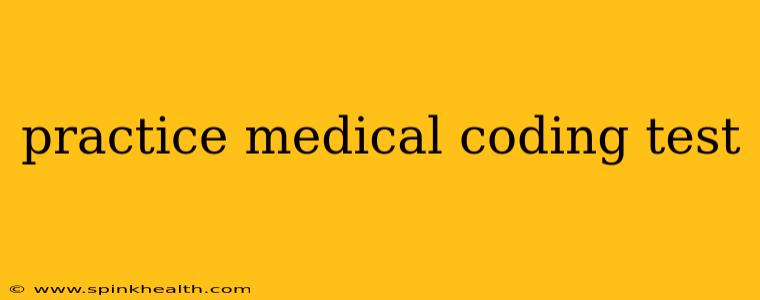Ace Your Medical Coding Test: A Journey Through Practice and Preparation
So, you're facing a medical coding test? The pressure is on, the stakes are high, and you need to feel confident and prepared. This isn't just about memorizing codes; it's about understanding the intricate language of medicine and translating it into the precise numbers that drive healthcare billing and reimbursement. Let's embark on a journey to help you master this crucial skill. This isn't your average "here's a list of codes" article; we'll explore the why behind the codes, offering a deeper understanding that will translate into a higher score and a more successful career.
What are the Different Types of Medical Coding Tests?
This is a crucial first step. The type of test you'll face will significantly influence your preparation strategy. Are you facing a certification exam like the CPC (Certified Professional Coder) or CCA (Certified Coding Associate)? Or is this an internal test for a specific healthcare facility? Understanding the test's scope – whether it focuses on inpatient, outpatient, or a combination, specific specialties, or general coding – will help you prioritize your study materials. Knowing the format – multiple choice, fill-in-the-blank, or even case studies – will also determine your best approach.
How Can I Best Prepare for a Medical Coding Exam?
Preparation is key. Imagine you're a detective meticulously piecing together a case. You wouldn't jump to conclusions; you'd gather evidence, analyze clues, and build a strong argument. Similarly, preparing for a medical coding test demands a systematic approach. Start with reviewing the foundational concepts of medical terminology, anatomy, and physiology. A strong grasp of these will make understanding the codes much easier. Think of it like learning a new language—you need to understand the vocabulary before you can form sentences. Then, dive into the coding manuals, focusing on the specific code sets you'll be tested on (ICD-10-CM for diagnoses, CPT for procedures, HCPCS for supplies and services). Don't just passively read; actively engage with the material through practice questions and mock tests.
What are Some Common Mistakes to Avoid During the Test?
Many errors stem from rushing or overlooking crucial details. Carefully read the entire medical record; don't jump to conclusions based on the initial symptoms. Double-check your code selections, ensuring accuracy and avoiding simple transcription errors. Manage your time effectively, allocating sufficient time for each question. If you're unsure about a code, make an educated guess based on your understanding of the medical record, but always review it later. Sometimes, the right answer is the one that fits most comprehensively.
What Resources Can I Use to Practice Medical Coding?
The internet offers a plethora of resources. Many online platforms provide practice exams, quizzes, and coding exercises. Consider these options to supplement your study:
- Coding textbooks and study guides: These offer comprehensive overviews of coding principles and procedures.
- Online practice exams: Numerous websites and applications offer simulated tests tailored to different certifications.
- Medical coding software: This allows you to practice coding scenarios in a realistic environment.
- Flashcards and other mnemonic devices: These help you memorize important codes and their associated terms.
Remember, consistent practice is crucial. The more you practice, the more comfortable you'll become with the coding process and the less likely you are to make errors under pressure.
What if I Fail the Medical Coding Test?
Don't be discouraged. Failing a test doesn't define your abilities. Analyze your mistakes, identify areas needing improvement, and focus on strengthening those areas. Use the experience as a learning opportunity, refine your preparation strategy, and try again. Remember, persistence and dedication are key to success.
This journey to mastering medical coding isn't a sprint; it's a marathon. With consistent effort, thoughtful preparation, and a willingness to learn, you'll be well-prepared to not only pass your test but also embark on a fulfilling career in medical coding. Good luck!

